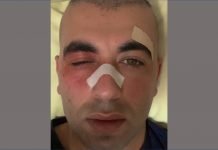Turkish government documents obtained by Nordic Monitor have confirmed that critics of President Recep Tayyip Erdoğan were spied on by Turkish diplomats in Niamey, capital of the West African country of Niger, amid an escalating witch hunt by the oppressive regime in Ankara that is bent on increasing spying activities in other countries to punish Turks who hold dissenting views of the Turkish government.
The documents sent home by Turkish diplomats led to a terrorism investigation of critics on fabricated charges conducted by a Turkish prosecutor.
The documents, incorporated into a criminal case, indicate that the Turkish Embassy gathered information on Turkish citizens believed to be affiliated with the Gülen/Hizmet movement, a group critical of President Erdoğan, and that Turkish educators, representatives of local associations, businessmen and their family members living in the country had been profiled by Turkish diplomats.
The information reported to the foreign ministry in Ankara was later used in a criminal indictment for a charge of terrorism by Turkish prosecutor Birol Tufan.
According to a December 12, 2018 decision by Tufan, the Ankara Chief Public Prosecutor’s Office launched a separate investigation (file no. 2018/27442) into 44 innocent people who were listed in espionage files dispatched by Turkish diplomats in Niamey without any concrete evidence of wrongdoing. They were charged with “membership in a terrorist group” by Tufan.

Those files might have been conveyed to the foreign ministry by Hüseyin Özdemir, the then-Turkish ambassador in Niamey between 2016 and 2018. Özdemir was appointed as chief advisor to Parliament Speaker Mustafa Şentop in 2019.
Judicial documents dated December 12, 2018 exposed how the spying activities at the Turkish Embassy in Niger triggered a criminal investigation in Turkey. (The names and addresses of the Turkish nationals have been redacted for security reasons.):
Critics of the Erdoğan government abroad, especially members of the movement, have been facing surveillance, harassment, death threats and abduction since President Erdoğan decided to scapegoat the group for his own legal troubles. They have often been denied consular services such as power of attorney and birth registry as well as revocation of their passports. Their assets in Turkey are seized and their family members at home risk criminal charges.
The judicial documents once more confirmed that spying activities by Turkish diplomatic missions result in serious consequences in the Turkish judicial system.
As previously disclosed by Nordic Monitor, the foreign ministry sent lists of profiled Turkish nationals in two CDs to the Ankara Chief Public Prosecutor’s Office, the national police and Turkey’s intelligence agency MIT on February 19, 2018 via an official document for further administrative or legal action, the punishment of their relatives back in Turkey and the seizure of their assets.
The public prosecutor who received the foreign ministry document on February 23, 2018 forwarded the classified CDs including information on 4,386 Erdoğan critics to the Organized Crimes Unit of the Ankara Police Department for further action. The police conveyed the results of its investigations to the public prosecutor.
According to judicial documents released by the Ankara 4th High Criminal Court on January 16, 2019, the foreign ministry compiled a long list of foreign entities that were owned and/or operated by people who were seen as close to the movement.
Turkish diplomatic missions continue systematic spying on Turkish government critics on foreign soil as confirmed by Foreign Minister Mevlüt Çavuşoğlu in February, 2020. Çavuşoğlu said Turkish diplomats assigned to embassies and consulates have officially been instructed by the government to conduct such activities abroad. “If you look at the definition of a diplomat, it is clear. … Intelligence gathering is the duty of diplomats,” Çavuşoğlu told Turkish journalists on February 16, 2020 following the Munich Security Conference, adding, “Intelligence gathering and information collection are a fact.”
In his interview with The Globe and Mail, Turkish Ambassador to Canada Kerim Uras also admitted to spying on 15 Turkish-Canadians. “Any embassy would focus on the threats targeting their countries. That’s what every embassy does,” he told The Globe and Mail.
It is clear that Turkish diplomatic missions violate the domestic laws of receiving states and the principles of international law by conducting unlawful information-gathering campaigns and sweeping intelligence operations. In the aftermath of the coup attempt in Turkey on July 15, 2016, some Western countries launched investigations into the spying activities on Turks and Turkish organizations overseas by Turkish Foreign Ministry personnel, representatives from relevant authorities, imams and intelligence officers accredited as diplomats.
The immunities and privileges of diplomats and consular staff are governed by international conventions. However, diplomats enjoying the privileges and immunities described in the Vienna Convention on Diplomatic Relations are under a duty to respect the laws and regulations of the receiving state and to avoid interfering in its internal affairs as detailed in Article 41. Similarly, consular staff are granted limited privileges and immunities by the Vienna Convention on Consular Affairs, but the host state authorities can start investigations and prosecute any of the personnel if they perpetrate crimes inside or outside the consulate premises, according to Article 43 of the convention.


















[…] According to court documents released in 2021, alleged supporters of the Gülen movement were spied on by the Turkish diplomatic missions in Hungary, Mozambique, Niger, Jordan, Gabon, Turkmenistan, Cameroon, Nepal, Angola, Albania, Argentina, Singapore, Indonesia, the Netherlands, Colombia, Malawi, the United Kingdom and the Philippines. […]